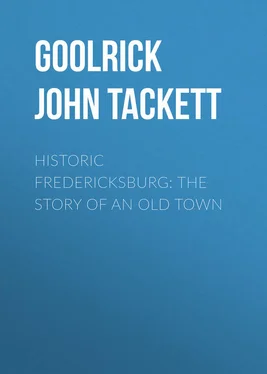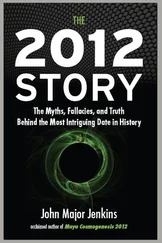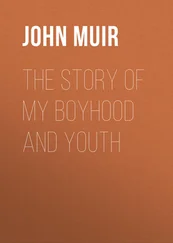John Goolrick - Historic Fredericksburg - The Story of an Old Town
Здесь есть возможность читать онлайн «John Goolrick - Historic Fredericksburg - The Story of an Old Town» — ознакомительный отрывок электронной книги совершенно бесплатно, а после прочтения отрывка купить полную версию. В некоторых случаях можно слушать аудио, скачать через торрент в формате fb2 и присутствует краткое содержание. Жанр: История, foreign_antique, foreign_prose, на английском языке. Описание произведения, (предисловие) а так же отзывы посетителей доступны на портале библиотеки ЛибКат.
- Название:Historic Fredericksburg: The Story of an Old Town
- Автор:
- Жанр:
- Год:неизвестен
- ISBN:нет данных
- Рейтинг книги:3 / 5. Голосов: 1
-
Избранное:Добавить в избранное
- Отзывы:
-
Ваша оценка:
- 60
- 1
- 2
- 3
- 4
- 5
Historic Fredericksburg: The Story of an Old Town: краткое содержание, описание и аннотация
Предлагаем к чтению аннотацию, описание, краткое содержание или предисловие (зависит от того, что написал сам автор книги «Historic Fredericksburg: The Story of an Old Town»). Если вы не нашли необходимую информацию о книге — напишите в комментариях, мы постараемся отыскать её.
Historic Fredericksburg: The Story of an Old Town — читать онлайн ознакомительный отрывок
Ниже представлен текст книги, разбитый по страницам. Система сохранения места последней прочитанной страницы, позволяет с удобством читать онлайн бесплатно книгу «Historic Fredericksburg: The Story of an Old Town», без необходимости каждый раз заново искать на чём Вы остановились. Поставьте закладку, и сможете в любой момент перейти на страницу, на которой закончили чтение.
Интервал:
Закладка:
While having the power to regulate, the court was not without regulation from a superior source as the articles of incorporation show that in case of misconduct on the part of the mayor or any member of the board, the others would have power to remove him after the charges had been fully proved, and it further stipulated that should any person elected to office fail or refuse to serve, he should be fined according to the following scale: mayor, fifty pounds; recorder, forty pounds; alderman, thirty pounds; councilman, twenty-five pounds. In 1782 an amendment was passed by the legislature, enlarging the jurisdiction of the court to include all territory within one mile of the town limits.
Fredericksburg was not long in recovering from the effects of the Revolution. It had suffered no physical damage, though it had lost a great deal of actual and potential value in the deaths of citizens who gave their lives for the cause. A magnificent Peace Ball was held, in 1784, in the assembly room over the old City Hall, at Main Street and “Market Alley,” which was attended by General Washington, General Lafayette, Rochambeau, Washington’s mother, who came leaning on his arm and all the notables and fashionables of the country. The town was soon again a thriving hustling center of trade and business.
New enterprises came as requirements of the times made themselves felt. In 1786 the Virginia Herald made its appearance, the first newspaper published in the town, and about the same time whipping posts, ducking stools, and pillories were established to keep down the criminal tendencies of the unlawfully inclined. In 1789 an act was passed, empowering the trustees of the Fredericksburg Academy to raise by lottery $4,000 to defray the expenses of erecting a building on the grounds for the accommodation of professors, a method of raising money that modern morals has outlawed. In 1795 the Episcopal Charity School was established by Archibald McPherson one of the splendid men of the town and in 1799 the town experienced its first serious fire, which was held by some to have been the work of an incendiary and by others as due to a wooden chimney. The council in an effort to assuredly exclude all danger of another such from either source, offered a reward of $500. for conviction of the incendiary, and passed an ordinance abolishing wooden chimneys, and stove pipes sticking through windows or the sides of houses, provided the buildings were not fire proof.
From 1800 to 1850 Fredericksburg was the principal depot of trade and commerce for all that region between the Rappahannock river and the counties of Orange, Culpeper, Rapidan, Madison and Fauquier in addition to the contiguous territory and the great section lying between the town and the Chesapeake bay. Commerce with the upper country, however, was the most productive, for the lower country people were in close connection with the rivers and, as in those days all shipping was done by water ways, they shipped from wharves along the Rappahannock near their homes. They received much of their goods in this manner and were not so dependent upon the town as the upper country people who were forced to bring their products to Fredericksburg by wagon trains, which lumbered slowly down with their burdens of grain, produce and tobacco, and having unloaded and tarried awhile, lumbered back even more slowly, loaded with groceries, wines, liquors, household stores, plantation supplies, dry goods and merchandise for the country stores.
These wagons were of huge dimensions, “their curving bodies being before and behind at least twelve feet from the ground” according to one writer. They had canvas covers and were drawn by four horses always, sometimes six and eight, carrying jangling bells upon their collars. As many as two hundred of them were often on the streets or in the wagon yards of Fredericksburg at one time, making prosperity for the energetic merchants of that distant day, and bringing business for the many vessels, some of them large three masted schooners, which came from all parts of the globe to anchor at the wharves.
At about this time Fredericksburg received two serious blows that greatly retarded its progress and prosperity. The first was in 1808, when nearly half the town was destroyed by a fire which broke out at the corner of Princess Anne and Lewis streets, where the Shepherd residence now stands, and fanned by a high wind quickly roared its way through the inflammable houses, such as most of the residences then were, until the town was half in ashes. At the outbreak of the fire most of the citizens were attending the races at “Willis Field,” just below the town, and before they could get back it had gained such headway that their efforts to check it were ineffectual. It is said the fire was caused by the overturning of a candle in the kitchen of the Stannard home, occupying the present site of the Shepherd residence, where refreshments were being prepared for the funeral of Mr. Stannard, and that the remains were gotten out of the house only with great difficulty on the part of the mourners. In those days funerals were accompanied by feasts, at which cake in sombre wrappings and wine in glasses with long black ribbons tied to the stems, were served.
Much of the brick construction on the upper business section of Main street, and a number of residences known as Colonial, are results of that fire, but deserve to be called Colonial as that period, architectually speaking, extended until about the year 1812. The Shepherd residence, of course, was built following the fire; the old Doswell home, now occupied by Mr. A. W. Rowe, probably was erected afterwards and the old Marye home, now owned by Mr. A. L. Jenkins, has a corner stone bearing the date 1812, the residence formerly occupying that site having been burned. However, most of the older residences in Fredericksburg antedate the fire, and are of an earlier Colonial period.
Another blow was the War of 1812, and though, as in the case of the Revolution, the city did not suffer actual physical damage, its business and trade were interrupted and severely decreased, if not totally stopped, due to the English dominance of the seas and during the course of that conflict, the commercial life must have been slow and stagnant.
Fredericksburg itself was for a time threatened when the English admiral, Cockburn, made a raid up the Rappahannock. Many thought his objective was Fredericksburg and General William Madison, brother of the President, summoned a small force which took up positions of defense, from which to repel the raider, but he never got up the river as far as the city, turning when much lower down and putting back to sea for a cause which history has not assigned. During this war, as had been the case in the Revolution, and was to be in the Civil war to come, the Mercer home, now occupied by Councilman George W. Heflin, which stands on an eminence on lower Main street commanding a splendid view of the river, was used as a post from which to watch for the approach of enemy ships, a use that has given it the name of “The Sentry Box.”
Following the War of 1812, Fredericksburg’s trade revived and increased, and the city settled down to a full enjoyment of that remarkably cultural era – the only classical civilization America has ever known – which lasted until the Civil war and which has been made famous in song and story and the history of the old South. The families of the early settlers had by now become wealthy; the plantation masters owned hundreds of slaves, farmed thousands of acres and lived in their handsome old Colonial mansions in the most magnificent style the times could afford. Surrounded by many servants and all the comforts known to the day, they entertained lavishly, kept splendidly stocked wine cellars, boasted of private race courses and keen thoroughbred hunters and racers, and, as the business of the plantations was largely in the hands of overseers, they were gentlemen of splendid leisure with an abundance of time opportunity and means to devote to sports, politics and literature. Most of them were educated abroad and were learned in the classics, clever and entertaining conversationalists, beautiful riders, excellent shots, and when not engaged in social or literary pursuits that kept them indoors, enjoyed the sports of the field, hunting to the hounds, gunning for quail, deer, bear, wild turkey or duck, or fishing in the abundantly supplied streams tributary to the Potomac and Rappahannock rivers. Hard drinking was not unusual among them, but they were men of the highest sense of honor and principle, and were always true to an obligation.
Читать дальшеИнтервал:
Закладка:
Похожие книги на «Historic Fredericksburg: The Story of an Old Town»
Представляем Вашему вниманию похожие книги на «Historic Fredericksburg: The Story of an Old Town» списком для выбора. Мы отобрали схожую по названию и смыслу литературу в надежде предоставить читателям больше вариантов отыскать новые, интересные, ещё непрочитанные произведения.
Обсуждение, отзывы о книге «Historic Fredericksburg: The Story of an Old Town» и просто собственные мнения читателей. Оставьте ваши комментарии, напишите, что Вы думаете о произведении, его смысле или главных героях. Укажите что конкретно понравилось, а что нет, и почему Вы так считаете.












